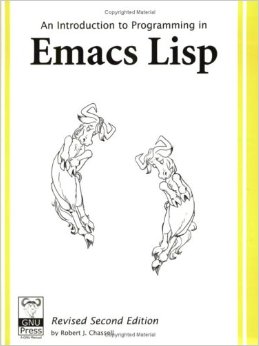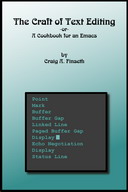
|
FreeComputerBooks.com
Links to Free Computer, Mathematics, Technical Books all over the World
|
|
- Title An Introduction to Programming in Emacs Lisp
- Author(s) Robert J. Chassell
- Publisher: Free Software Foundation; 8th edition (October 1, 2008)
- Paperback 272 pages
- eBook HTML, PDF, PostScript, etc.
- Language: English
- ISBN-10: 1882114027
- ISBN-13: 978-1882114023
- Share This:

|
This tutorial is an elementary introduction to teach non-programmers how to customize their work environment; it can also be used as an introduction to programming basics. It includes numerous exercises and sample programs; the author also walks you through the actual source code of several GNU Emacs commands. A handy reference appendix is included.
Emacs Lisp is a simple, complete, and powerful programming language. It is the building block of GNU Emacs, which is an integrated development environment with special features for scanning and parsing text as well as for handling multiple files, buffers, displays, windows, and sub-processors.
This text will show you: * how to set variables and write function definitions * How to use "if" and "let" * How to write "while" loops and recursive loops * How to search for a word or expression * How to customize GNU Emacs for yourself, even when it is shared on a network. * How to debug programs * and much more. This revised third edition covers new features included in GNU Emacs version 21, while remaining compatible with earlier versions.
About the Authors- N/A

- An Introduction to Programming in Emacs Lisp (Robert J. Chassell)
- The Mirror Site (1) - PDF
- The Mirror Site (2) - HTML
-
 GNU Emacs Lisp Reference Manual (Bil Lewis, et al)
GNU Emacs Lisp Reference Manual (Bil Lewis, et al)
This manual attempts to be a full description of Emacs Lisp. Emacs Lisp is more than a mere 'extension language'; it is a full computer programming language in its own right. You can write new code in Emacs Lisp and install it as an extension to the editor.
-
 The Craft of Text Editing: Emacs for the Modern World, 3rd Edition
The Craft of Text Editing: Emacs for the Modern World, 3rd Edition
This book covers all of topics related to text editing and more. By following the design of a character-based text editor, you will learn what goes into the such programs. In addition, this book introduces the concepts and power of the Emacs-type of text editor.
-
 Introduction to newLISP (WikiBooks)
Introduction to newLISP (WikiBooks)
You'll find newLISP easy to learn and powerful, combining some of the power and elegance of classic LISP with the facilities of a modern scripting language, such as regular expressions, network functions, Unicode support, multitasking, and many others.
-
 Practical Common Lisp (Peter Seibel)
Practical Common Lisp (Peter Seibel)
This book presents a thorough introduction to Common LISP, providing you with an overall understanding of the language features and how they work. Over a third of the book is devoted to practical examples such as the core of a spam filter, web apps for MP3s, etc.
-
 On Lisp: Advanced Techniques for Common Lisp (Paul Graham)
On Lisp: Advanced Techniques for Common Lisp (Paul Graham)
Written by a Lisp expert, this is the most comprehensive tutorial on the advanced features of Lisp for experienced programmers. It shows how to program in the bottom-up style that is ideal for Lisp programming.
-
 Algorithmic Composition: Music Composition using Common LISP
Algorithmic Composition: Music Composition using Common LISP
This book provides an overview of procedural approaches to music generation. It introduces programming concepts through many examples written using the Common LISP and Common Music for music composition and sound synthesis.
-
 Common LISP - The Language, 2nd Edition (Guy L. Steele JR.)
Common LISP - The Language, 2nd Edition (Guy L. Steele JR.)
This is the Lisp programmers' bible. If you need to know the official specification, every function defined in Common Lisp can be found in here somewhere. Anyone vaguely serious about programming in Lisp should keep a copy of this book for reference.
-
 Lisp Hackers: Interviews with 100x More Productive Programmers
Lisp Hackers: Interviews with 100x More Productive Programmers
Overall, this book should give an insight into why people use Lisp, as well as help the readers gain some new experience and improve as programmers. It's a collection of short interviews with 14 prominent individuals from different parts of the world.
-
 Paradigms of Artificial Intelligence Programming: in Common Lisp
Paradigms of Artificial Intelligence Programming: in Common Lisp
This book is an overview of classical artificial intelligence (AI) programming via actual implementation of landmark systems (case studies). It teaches advanced Common Lisp techniques in the context of building major AI systems.
-
 Let Over Lambda - 50 Years of Lisp (Doug Hoyte)
Let Over Lambda - 50 Years of Lisp (Doug Hoyte)
This book is one of the most hardcore computer programming books out there. Starting with the fundamentals, it describes the most advanced features of the most advanced language: Common Lisp.
-
 Successful Lisp: How to Understand and Use Common Lisp
Successful Lisp: How to Understand and Use Common Lisp
This book is written with the professional programmer in mind. Using a hands on approach it introduces the ANSI Common Lisp standard. Practical examples of working code provide an in depth view of Common Lisp programming paradigms.
-
 Common LISP: A Gentle Introduction to Symbolic Computation
Common LISP: A Gentle Introduction to Symbolic Computation
This highly accessible introduction to Lisp is suitable both for novices approaching their first programming language and experienced programmers interested in exploring a key tool for artificial intelligence research.
-
 Common LISP: An Interactive Approach (Stuart Charles Shapiro)
Common LISP: An Interactive Approach (Stuart Charles Shapiro)
The text uses a tutorial style that focuses on learning by interaction and experimentation. The text also thoroughly covers programming in Pure LISP before programming in Imperative LISP so that students get used to recursive programming.
-
 ANSI Common LISP (Paul Graham)
ANSI Common LISP (Paul Graham)
This book provides an excellent introduction to Common Lisp. In addition to chapters covering the basic language concepts, there are sections discussing the Common Lisp object system (CLOS) and speed considerations in Lisp.





